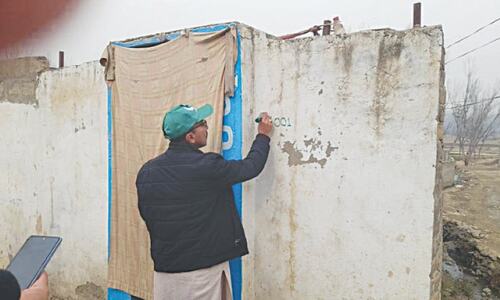PESHAWAR, June 14: In a move ostensibly aimed at easing US pressure, the government has introduced a new clause to a draft peace agreement for South Waziristan to stop tribal militants from cross-border activities, Dawn has learnt.
The revised draft agreement says the Mehsud tribe, including the Taliban, would not violate Pakistani and Islamic laws “within the country, across the border and abroad”.
“We the Mehsud tribe, including the Taliban, will not violate the law of Islam and Pakistan within the country, across the border and abroad,” a carefully structured new clause to the proposed peace agreement said.
The 15-point revised draft has two new clauses.
The head of the Pakistani Taliban, Baitullah Mehsud, told reporters last month that Islam did not recognise borders and waging Jihad against foreign occupation forces was obligatory upon all Muslims.
The second new clause requires the Mehsud tribe to cough up Rs5 million within two months of signing the peace agreement as payback for the losses suffered by the government both in terms of men and material.
A senior government official said the amount would be used to rebuild the Sara Rogha fort.
Hundreds of militants had attacked the British-era fort on the night of Jan 16, killing 22 paramilitary soldiers and taking several others hostage. The only fort located inside the inhospitable Mehsud territory was later dynamited and virtually razed to the ground.
“This may not be a big amount but we want to establish a principle; the government is asked to pay compensation for the losses made to the life and property of tribal people, but they (militants) too should pay up for the losses suffered by the government,” the official said.
He said the revised draft had been handed over to tribal interlocutors, who in principle had approved of the two new clauses.
The official said the Mehsuds had reservations over the inclusion of any clause regarding cross-border activities because “the areas they control are not near the border”.
The government was told that it would be nearly impossible for the Mehsud tribe to stop cross-border activities since it did not have any influence over the Wazir tribe, which inhabits the areas bordering Afghan territory.
In plain words, the Mehsud tribesmen would like to shift the onus for stopping cross-border activity to Wazir tribe, the official said.
In the revised draft agreement, the clause pertaining to the presence of foreign militants in Mehsud territory has also been modified.
The previous draft required the Mehsuds to expel foreign militants from their soil within one month of signing the peace agreement, a period extendable to two months if conditions so demanded.
But the revised draft says the expulsion of foreign militants would commence soon after the signing of the peace agreement and the whole process would be completed within two months. A reprieve of a further two months could be granted if required.
The official said the government had given a go-ahead to the tribal interlocutors and if an understanding were achieved, the signing could take place as early as next week.
The document says the agreement would be signed by the administrator of South Waziristan tribal region and elders of the three main Mehsud sub-tribes.
Some terms of the draft have already been implemented by both sides. These include the pullback of troops, a swap of prisoners and lifting of road blockades to allow hundreds of thousands of displaced Mehsuds to return to their homes.
This, apparently, is the reason why two clauses --- 10(a & b) and 11 that required the two sides to exchange prisoners and called for the “gradual withdrawal” of security forces --- have been omitted from the revised draft.
A pamphlet floated by militant commander Baitullah Mehsud had asked government officials to return to the Mehsud territory and resume their work without any fear.
This appears to be the implementation of clause 5 of the draft agreement that required the Mehsuds to allow government officials to resume work, and not create hurdles in development work by national and international contractors.
Other clauses of the revised peace agreement however, remain unchanged. Among them are those relating to the cessation of hostilities and attacks on government and security installations and personnel, resolving disputes in conformity with local customs and the Frontier Crimes Regulation.
The official said the names of members of a committee would be announced the day the peace agreement was signed. The body would oversee its implementation and take cognisance of any violation.
It gives the government and the security forces the right to respond to any attack on its installation and notify the committee about any violation.
Another clause (number 8) of the revised draft says that the administration would inform the tribe concerned of the existence of any “terrorist training camps”, including the ones used for training suicide bombers.
“The government has the right to take action in accordance with the custom/FCR if the tribe after ascertaining the fact fails to take any action on its own.”
Dawn has learnt that the government was contemplating more or less similar peace agreements with tribes in Bajaur and Mohmand tribal regions and the semi-autonomous Frontier Regions of Darra Adamkhel.
The drafts of the proposed agreements have been under discussion and government officials are hopeful that these could be ready for signature in two weeks.














































Dear visitor, the comments section is undergoing an overhaul and will return soon.